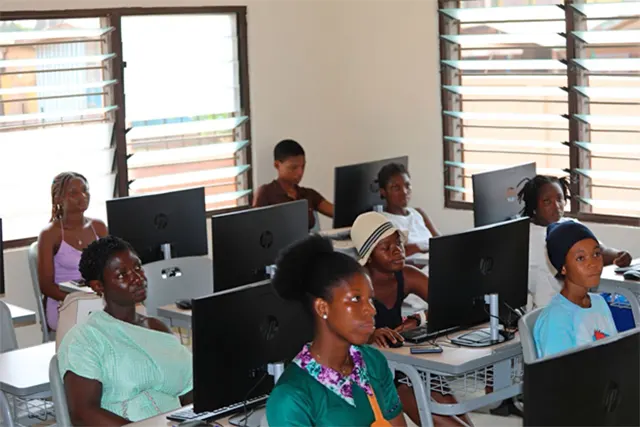Some participants at the training
The Digital Access to Rural Empowerment (DARE) programme has commenced a transformative digital training opportunities in Somanya and Bekwai for underserved communities in Ghana.
The first phase of the initiative, which began on Monday, May 12, 2025, is currently training 80 young mothers and women aged between 15 and 35.
The training focuses on equipping participants with practical digital skills designed to enhance employability, support entrepreneurship, and ultimately drive economic independence in rural settings.
Speaking to the media, Mr. Frederick Yeboah, Director of Innovation at Ghana India Kofi Annan Centre of Excellence (GI-KACE), Consult and the Project Coordinator, said the programme is not only aimed at providing digital skills, but also expected to create pathways for sustainable livelihoods for young women and mothers in rural Ghana.
“In this first phase, we expect to train around 240 participants across the communities, preparing them to access meaningful employment opportunities or start income-generating ventures,” he stated.
Through a carefully curated curriculum, participants will be introduced to essential ICT tools, online platforms for business, and digital entrepreneurship concepts incorporating soft skills development and mentorship to support long-term success.
The ‘DARE’ programme is a timely intervention for communities like Somanya in the Yilo-Krobo Municipality and Bekwai, where digital exclusion has hindered economic growth for women and youth.
By promoting inclusion and resilience, DARE is positioning itself as a catalyst for broader socioeconomic transformation in Ghana’s rural landscape.
In partnership with the MasterCard Foundation and implemented by GI-KACE Consult, with UNESCO and University of Ghana Business School as partners, the programme is already impacting lives across its pilot locations. The programme is expected to expand its reach in subsequent phases, scaling up to include additional communities while strengthening partnerships with local leaders, state agencies, and community-based organisations.
As the training continues, early feedback from participants reflects optimism, motivation, and a renewed sense of purpose, marking a significant milestone in the journey toward digital inclusion and empowerment in Ghana.
